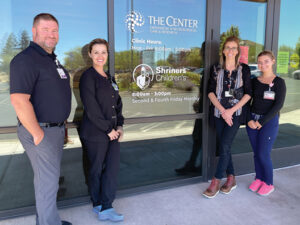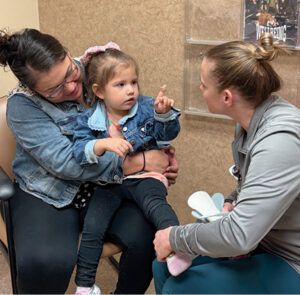It’s simple. Help more kids. That’s the driving force behind Shriners Children’s unwavering commitment to transforming young lives far into the future.
So, how is the healthcare system increasing access, minimizing travel burdens and bringing care closer to where people live?
Reaching more families in the Pacific Northwest
Mariah and her son Jonah, 4, have logged many miles making the three-hour drive from Missoula, Montana, to Shriners Children’s Spokane, where Jonah has been a patient since birth. Born with clubfeet, he has received ongoing care at the hospital his entire life.

Staff members at the Redmond, Oregon, clinic are ready to welcome patients and families from Central Oregon.
“In Missoula, we’ve lost some orthopedic providers, and we don’t have any orthopedic offices that specialize in treating kids anymore,” said Mariah. So, the family sought treatment with the specialists at Shriners Children’s – a decision they couldn’t be happier with. But the time and distance has been a challenge.
Depending on where families live, getting to appointments and staying current with their care plan can be challenging. However, accessing care is now easier than ever, thanks to five successful outreach clinics across the region. Shriners Children’s Spokane now operates two clinics in central Washington – Richland and Yakima; two in western Montana – Missoula and Kalispell; and one in Fairbanks, Alaska. In 2024 alone, nearly 900 children received care at these clinics.
These clinics remove barriers for families where travel might be an obstacle. Outreach clinics offer time-saving care for hundreds of families who no longer have to drive or fly their children to Spokane to see their care team.
“We want to better serve the needs of the families throughout our region by bringing our medical staff closer to the communities where they live,” said Shriners Children’s Spokane Hospital Administrator Peter Brewer. “It is ultimately an extension of the outpatient clinic in Spokane. Kids see the same medical staff, just in a different location.”
The Spokane hospital has also expanded the program to include Pediatric Orthotic and Prosthetic Services (POPS) providers on-site. Some Shriners Children’s Spokane surgeons have been credentialed at the local surgical centers to perform outpatient surgeries rather than require patients to travel to our facility.
“Having an outreach clinic right down the street is amazing,” shared Mariah. “Most of these kids need ankle-foot orthoses or braces, and where we live makes getting good ones difficult. Having the orthotics team come to us to fit the kids or fine-tune their braces is such a blessing. Shriners Children’s has been amazing for our family.”
Bringing care closer to families in the Midwest
Shriners Children’s Twin Cities is another location making specialized pediatric care more accessible for families. Outreach clinic sites in Omaha, Nebraska, and Rapid City, South Dakota, enable medical teams to deliver high-quality care directly to the communities where patients reside, minimizing the need for families to travel long distances and ensuring they receive consistent, specialized care.

At the outreach clinic in Rapid City, South Dakota, Pamela Lang, M.D., engages mom Kacena and daughter Ruder during a follow- up visit.
Bradie Bresina, RN, BSN, nurse care coordinator, emphasizes this model’s benefits to families. “Outreach clinics allow children who live farther away to be seen more often, providing a level of convenience that significantly eases the burden on parents and caregivers,” she said. Instead of traveling to the main clinic in Woodbury, Minnesota, for every appointment, families can visit outreach clinics, making healthcare more accessible and reducing the stress and financial strain associated with long trips.
While families still need to schedule some appointments at Shriners Children’s Twin Cities, where there is a full range of services, outreach initiatives ensure that every child has access to the best possible care, no matter their location.
Another significant benefit of outreach clinics is their ability to provide more frequent assessments of orthotics and prosthetics. Thanks to the outreach clinics, POPS staff can deliver and adjust orthotic and prosthetic devices directly at these locations, ensuring that children continue to receive the support they need without delay.
Beyond the medical benefits, these outreach visits also have an emotional and community-building aspect. “The kids and families are pretty excited during outreach,” said Bresina. “It’s like they are proud to have you come to where they live.” This sentiment captures the deep impact these visits have, fostering a sense of trust and connection between families and our medical teams.
Teamwork is key
Shriners Children’s locations in Massachusetts have a long-standing collaboration that supports patients with prosthetic and orthotic needs resulting from burns and other traumatic injuries. The Shriners Children’s New England POPS team works seamlessly with the Shriners Children’s Boston therapeutic services department to optimize a patient’s function and independence as they recover.
Brock McConkey, CPO, prosthetics and orthotics manager at Shriners Children’s New England in Springfield, Massachusetts, travels to Boston once or twice a month to evaluate and fit patients for prosthetic and orthotic devices. Boston’s occupational and physical therapists, led by Director of Therapeutic Services Lori Connolly, PT, DPT, work with patients as they prepare to receive and acclimate to their devices.
Telehealth visits are convenient when challenges arise between McConkey’s travels to Boston. “Our patients are often not local to Massachusetts, making the traditional process of custom molding and fabricating braces, orthoses and prosthetics more challenging,” said Connolly. “We often have short time frames in which to complete these devices, adding to the complexity of the situation.”
Occasionally, McConkey sees Boston patients at the Shriners Children’s New England facility if it best meets the needs of a patient and their family. “Children dealing with burn injuries are going through so many things at once,” he said. “We have to be flexible.”
Connolly’s team has a solid foundation of fabrication skills, with the ability to adjust a patient’s device so they can continue to progress until their next POPS appointment. “I am thankful to have a department of creative and adaptive therapists,” she said. “Their experience, combined with Brock’s expertise, really optimizes the potential for our patients.”
In addition to their medical needs, an even larger team coordinates many behind-the-scenes logistics to assist Shriners Children’s Boston POPS patients. “We also communicate with our care management team, the Shriner volunteers who often provide transportation, as well as sponsors who support our families staying in the Boston area,” said Connolly. “It truly takes a village to ensure the best care for these patients.”





